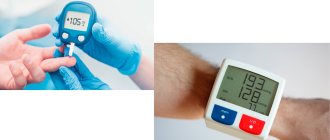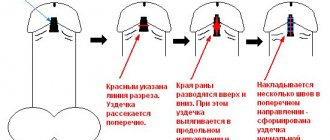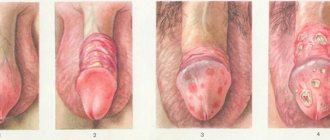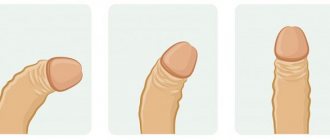Causes of Erectile Dysfunction
The reasons for the inability to achieve and maintain an erection can be organic, psychogenic or mixed.
The most common ones include the following:
- Inflammatory diseases of the male genital organs (prostatitis, chronic prostatitis, orchiepididymitis)
- Diabetes mellitus, atherosclerosis, and cardiovascular diseases
- Acute and chronic poisoning - household (smoking, alcohol, drugs) and industrial
- Hormonal disorders (dysfunction of the pituitary gland, adrenal glands, thyroid gland, absence or hypoplasia of the testicles)
- Irradiation
- Spinal injuries and diseases
- Chronic diseases
- Passive lifestyle
- Stress and depression
- Psychological reasons. Moreover, both on their own and in combination with physiological factors
The health of patients is the most important thing for us
The causes of erectile dysfunction can be different; therefore, the choice of the correct treatment method that guarantees the effectiveness of treatment depends on an accurate and comprehensive diagnosis and on the correct clinical thinking of a medical specialist. Accurate determination of the causes of the disease is 70% of the success of treatment!
The Euromedprestige clinic has a full range of laboratory, instrumental and functional diagnostics necessary for the treatment of erectile dysfunction
Erection mechanisms
Before we start talking about the problem of erectile dysfunction, it seems necessary to refresh our memory a little about the structure of the penis, as well as modern ideas about how it functions.
The male penis consists of two cavernous and one spongy bodies. The corpora cavernosa resemble a spindle in shape and are located next to each other, and the corpus spongiosum, which passes into the head of the penis, is located under them. The bodies of the penis are not connected by blood vessels. Each body has its own artery through which blood is delivered to it, and its own veins through which this blood flows out of it.
The structure of the penile shaft resembles a sponge. They contain many small lacunae, or caverns in Latin. It is this feature of their structure that makes the phenomenon of erection possible. You can read more about the structure of the male genital organs in the corresponding article.
When a man is sexually aroused, the following happens in the penis. The arteries that bring blood to the cavernous and spongy bodies expand, and the veins through which the blood flows out sharply narrow. As a result, a significant amount of blood accumulates in the bodies of the penis, or rather, in their lacunae, each lacuna becomes tense, and an erection occurs. This state of the blood vessels persists throughout the entire erection. At this time, all tissues of the penis, with the exception of the skin, do not receive the blood supply they need and are in a state of ischemia. With very prolonged sexual intercourse, over time this can lead to certain problems, which we will talk about later.
Neurogenic
Impotence in men can be associated with the consequences of strokes, diseases and injuries of the peripheral nerves and central nervous system. The reason for weak potency (erection) in this case is the complete absence or difficulty in the passage of nerve impulses into the cavernous bodies. In 75% of cases, the problem of erectile dysfunction develops against the background of spinal cord injuries, in 25% of cases - in the presence of neoplasms, cerebrovascular pathologies, herniated discs, multiple sclerosis, syringomyelia and other diseases.
Forms and causes of male impotence
Erectile dysfunction can be caused by several types of causes - endocrine, drug, local, neurological and vascular. All this refers to the organic form of erectile dysfunction, when it is caused by some change or disorder in the body. Much more common is the psychological form of erectile dysfunction, in which normal sexual life is hampered solely by the psychoneurological characteristics of the man. In addition, almost always, to problems with erection caused by organic causes, a psychological component is added, which, after eliminating the root cause, can come first.
Hormonal
The reasons for weak erection (impotence) may lie in a lack of testosterone in the body. This condition is scientifically called “hypogonadism.” Most often, this type of erectile dysfunction is observed in middle-aged and elderly men, less often in young people. With a lack of testosterone, the reactions responsible for erection are inhibited. Hormonal causes that lead to impotence also include endocrine disorders associated with excessive production of prolactin. Prolactin has an antagonistic effect on testosterone.
Endocrine causes of erectile dysfunction
Endocrine causes of erectile dysfunction primarily include hypogonadism - insufficient function of the gonads and low production of the male hormone testosterone. In addition to problems with erection in this condition, a man notices an increase in the timbre of his voice, a cessation of hair growth on the face and body, and fat deposition on the chest, hips, and buttocks. As a rule, such changes occur in severe disorders of the hormonal system of the human body, and in these cases the help of an endocrinologist is definitely needed. Fortunately, such diseases are relatively rare.
Another endocrinological cause of erection problems can be a tumor of the pituitary gland, one of the most important endocrine glands of the human body, which is located in the brain. If such a tumor secretes a hormone called prolactin, then no other changes in the body other than persistent erectile dysfunction will be noted. In this case, for diagnosis it is necessary not only to examine the person’s hormonal status, but also to perform a computed tomography scan of the brain.
WHO statistics on causes of impotence
There is an opinion that age affects impotence - this is not true!
Every fifth man in the world faces erectile problems.
- 25% of them are aged 20-25 years.
- At the age of 30-35 years (when the peak of a man’s sexual activity occurs) 10-15%.
- At 40-45 years of age, impotence occurs in 30-35% of cases.
- At the age of over 50 years, impotence occurs in 35-40%.
Moreover, at each specific age, impotence for psychological reasons is 80-85%. However, over the age of 50, statistics on impotence are influenced by statistics on chronic diseases.
Medicinal causes of erectile dysfunction
There are several types of drugs that can have an adverse effect on the erectile function of the male body. Hormonal drugs that block the action of male sex hormones (so-called antiandrogens), as well as drugs of female sex hormones, cause serious problems with erection due to disruption of the entire hormonal mechanism of its occurrence. Such drugs are usually prescribed only for severe diseases, the most common of which is prostate cancer. In this case, doctors are guided by the principle “not to worry about fat,” when first of all it is necessary to prolong and make the patient’s life as easy as possible.
However, I personally know of cases where powerful antiandrogens (even otherwise called castration drugs, I think it’s clear why) were prescribed by one “good” doctor to patients with benign prostatic hyperplasia (better known as adenoma). Needless to say, they help without fail, but at the same time all the men realized in horror that they no longer felt like that. Fortunately, erectile function quickly recovered after discontinuation of the drug.
Other medications that affect erection include all substances that have an inhibitory effect on the cerebral cortex. These are mainly alcohol and narcotic drugs, which, in addition to their effects on the brain, cause general exhaustion of the body, which in no way contributes to erectile function in particular or reproductive function in general. In such cases, to restore normal erection, not only complete withdrawal of the drug is necessary, but also a properly conducted period of convolution.
In addition, there are some drugs, according to the pharmacological classification, belonging to very different groups, which have the property of blocking the peripheral nerve endings responsible for the occurrence of an erection. Who knows, for example, that antihistamines, the most famous representative of which is diphenhydramine, for this reason cannot be taken for more than 10 days? If the issue of normal erection is not indifferent to you, then when prescribing any drug to you, ask your doctor whether it causes such disorders. A small selection of various substances and drugs that can have an effect on erectile function is presented in the table.
Substances acting on the central nervous system:
- Alcohol
- Aminazine
- Amitriptyline
- Arrametidine
- Barbiturates
- Heroin
- Hydroxyzine
- Glutethimide
- Guanethidine
- Debrisoquin
- Doxepin
- Isocarboxazid
- Imipramine
- Cannabis
- Cocaine
- Mebanazine
- Methadone
- Morphine
- Pargilin
- Protriptyline
- Lithium salts
- Thioridazine
- Tranylcypromine
- Phenamine
- Phenelzine
- Phenoxybenzamine
- Fluorophenazine
- Chlomipramine
Antihypertensive drugs:
- Clonidine
- Clofibrate
- Methyldopa
- Reserpine
Drugs affecting synapses
- Anaprilin
- Anticholinergic drugs
- Phentolamine
Hormonally active drug
- Antiandrogens
- Estrogens
Antihistamine drug
- Diphenhydramine
- Suprastin
Miscellaneous
- Antiparkinsonian drugs
- Indomethacin
- Spironolactone
- Thiazide diuretics
- Cimetidine
Local causes of erectile dysfunction
These are factors of different origin, but they all lead to sclerosis of the cavernous bodies. In this case, the thin elastic tissue of the cavernous bodies is partially or completely replaced by coarse hard connective tissue, which is not capable of providing an erection. This can be caused by injuries to the penis, multiple injections into the penis, or previous priapism (painful erection that does not go away for a long time and is not associated with sexual arousal). Sclerosis of cavernous tissue can also be caused by frequent practice of prolonged sexual intercourse, in which a man, in order to give his beloved the greatest pleasure, delays ejaculation in every possible way, and sexual intercourse lasts more than 4 hours. This practice cannot be called useful from the point of view of its influence on male potency, and its effect on the condition of the tissues of the penis cannot be called positive.
Sclerosation of cavernous tissue is a very unfavorable prognostic sign for erectile dysfunction. If the fact of sclerosis is diagnostically proven, only penile prosthesis operations can help such a patient.
Neurological causes of erectile dysfunction
Neurological causes of erectile dysfunction may include diseases such as epilepsy, Parkinson's disease, multiple sclerosis, injuries to the brain and spinal cord, pelvis and perineum, and various operations on these areas. As a rule, other manifestations of the disease are so severe and serious that erection problems recede even further than into the background. However, severe erectile dysfunction after surgery or injury often becomes a serious problem. Unfortunately, even here the capabilities of modern medicine leave much to be desired, and it is rare that such patients can be helped otherwise than by implanting a penile prosthesis
Vascular causes of erectile dysfunction
This is one of the most common groups of causes of male impotence. As we have already said, during a normal erection, the flow of arterial blood to the penis sharply increases, and the outflow of blood through the veins is almost completely blocked. This gives rise to two main types of vascular disorders in erectile dysfunction - insufficient arterial inflow and excessive discharge of blood through the veins of the penis. In the first case, the erection takes a long time, is difficult, is rarely of very high quality, and more often the penis is in some intermediate position between a calm state and excitement. In case of a violation of the venous block, on the contrary, arousal of the penis occurs quickly, an erection can be very good, but passes very quickly, not allowing completion, and sometimes even beginning, of sexual intercourse.
These disorders can develop in diseases such as endarteritis, atherosclerosis of the aorta and large arteries, aortic aneurysm, varicose veins, as a result of various injuries to the pelvic area and perineum. Unfortunately, the causes of disorders of the vascular mechanism of erection have not been studied so well to date that it is possible in each case to confidently identify the root cause that caused erectile dysfunction.
Particular attention should be paid to problems with erection in hypertension and diabetes. Erectile dysfunction in them can be associated with different groups of causes - neurological, vascular, local and medicinal. And this makes the treatment of erection problems in these diseases extremely difficult.
I will also say a few words about erectile dysfunction in chronic prostatitis. On the one hand, it is due to general exhaustion of the body and, to a large extent, psychological factors - after all, prostatitis, as is known, often leads to the development of deep depression in men. On the other hand, problems with erection in chronic prostatitis can be caused by the involvement in the inflammatory process of the nerve bundles responsible for the occurrence of erections that pass through the prostate gland. To restore normal erectile function, it is necessary to completely cure the disease, or at least achieve its stable remission. Ideally, such patients should consult a sexologist after treatment.
Psychological causes of erection problems
However, despite the large number of diseases and conditions that can lead to erectile dysfunction, most often erectile dysfunction is caused by the mental characteristics of a man. And if we also take into account the fact that any organic disorder of erectile function is necessarily accompanied by a psychological component, then it becomes clear what an important place the psychological causes of erectile dysfunction occupy among all other causes.
A man’s erection may not appear, quickly disappear or be of poor quality if he has depression or prolonged stress (by the way, did you know that stress is a very useful state for the body, which, like training for an athlete, stimulates the work of all vital functions body, and only prolonged stress brings harm?), fatigue, general poor health, dissatisfaction with oneself, a partner, the situation, in case of conflicts with a partner, discrepancy between sexual habits and the requirements of partners, fear of possible pregnancy or infection with a sexually transmitted disease, most often AIDS. An erection may not occur if sex occurs in some situation that does not provide a sense of calm and safety (the back seat of a car, a parent's house, an unlocked office room, an elevator).
The psychological form of erectile dysfunction includes such a variety as the inability to perform sexual intercourse with one partner while being consistently successful with others (the so-called selective erectile dysfunction). Older men often complain about the absence or poor quality of erection during sex with their wives, while erection problems do not arise with their mistresses. However, I have also encountered opposite cases, when a man was extremely worried that an erection occurred only on the marital bed, and with other partners he invariably suffered a fiasco.
Another variant of erectile dysfunction, caused by the peculiarities of the male psyche, is the so-called first meeting syndrome. In this case, a man has problems with erection only during the first intimacy with his partner, and in all other meetings everything is fine. Here it is worth highlighting the first sexual intercourse of a man, during which the excitement is often so great that by the time sexual intercourse begins, the body gets tired of it and the erection disappears. For many young men, failure at the first sexual intercourse (especially if the partner’s behavior was not entirely correct) becomes a big psychological blow, and can subsequently cause great difficulties and problems in this area of life.
I will also dwell on such a form of psychological erectile dysfunction as the inability to have sexual intercourse with a condom. The policies of many pharmaceutical companies, heavily reinforced by the influence of the media, lead many young people to firmly believe that sex without a condom is completely unacceptable. Meanwhile, for a number of psychological reasons, putting a condom on the penis is a certain stress for a man, which is often completely incompatible with a normal erection. As a rule, replacing the condom with another contraceptive method solves this problem.
Finally, with a man’s labile psyche, a situation is possible in which one accidental failure during sexual intercourse causes very strong anxiety during the next intimacy with his partner, which leads to erectile dysfunction this time too. Accumulating from time to time, a man’s conviction of his own inferiority can make him absolutely impotent even in his youth. A similar condition can develop after an illness that has affected erection, when the organic cause of dysfunction is eliminated, but problems with erection remain the same.
In the vast majority of cases, distinguishing the psychological form of erectile dysfunction from the organic one is not particularly difficult. In addition to the described cases of the absence of an erection in some situations while maintaining it in others, most often with the psychological form of erectile dysfunction, an erection remains during masturbation and the so-called phenomenon of nocturnal swelling of the penis, or morning erection. The reasons for morning erections still remain unclear. Some experts claim that it is associated with the effect of a full bladder on the prostate gland, others - with erotic dreams, which allegedly regularly visit each of us. However, both of these points of view do not stand up to criticism - morning erections often occur after waking up and cannot be caused by dreams, and, according to the first point of view, an erection should occur every time the bladder is full, which, to put it mildly, is not true.
How to distinguish the psychological cause of impotence from the physical one?
An andrologist can easily distinguish the psychological cause of impotence from the physical one. To do this, it is enough to interview a man and do a few manipulations.
Impotence due to psychological reasons:
- erection persists in the morning and during masturbation;
- checking the bulbocavernosus reflex - pressing on the tip of the head of the penis will cause an involuntary contraction of the anal sphincter.
In addition, to be completely sure, objective research is carried out:
- Ultrasound of the penis;
- sensors for recording nocturnal erections;
- biothesiometry;
- blood test for hormones, etc.
Determining the cause of impotence is very important because depending on this, treatment will vary.
Let's talk about the treatment of male impotence
The reluctance of men to consult doctors for the treatment of erectile dysfunction is a big problem for doctors all over the world, but it is especially relevant in our country, where it is not customary for the general public to go to doctors with personal problems. And, frankly speaking, one can imagine how they will look at a man in an ordinary district clinic who, at the end of the working day, will complain to a tired aunt-therapist about his failures on the personal front. In addition, the psyche of a man in terms of his sexual characteristics is extremely vulnerable, and the expression “problems in his personal life” often turns into “personal problems,” that is, into problems that cannot be shared with anyone. Meanwhile, modern medicine has a very significant arsenal of tools necessary to help such patients.
In principle, any measure aimed at improving and normalizing any body functions can be considered as a means of restoring erectile function. Therefore, physiotherapy, hyperbaric oxygen therapy, magnetic and laser therapy are often used in combination with other therapeutic measures.
Unfortunately, with organic forms of erectile dysfunction, very often doctors are not able to completely rid a man of the underlying disease that led to erection problems. In such cases, symptomatic treatment is carried out, that is, treatment, the task of which is only to restore the man’s ability to have a normal erection. A number of methods have been developed for this. Let's talk about each of them separately.
Local negative pressure therapy
The essence of this method is quite simple. Before sexual intercourse, a man places his penis in a special reservoir, pressing it tightly against the body, in which negative pressure is created using a pump. Under its influence, the arteries of the penis dilate and an erection occurs. Before removing the penis from the reservoir, a special tourniquet is placed on its base, blocking the venous outflow of blood from the cavernous bodies. As a result, the achieved erection is enough to perform at least one sexual intercourse.
This technique is distinguished by its low cost, complete painlessness and safety, and its disadvantages include some inconvenience in use and the relatively low quality of erection that is achieved as a result of using the method.
Intracavernous administration of drugs
This is the very first method of artificially achieving an erection; it has been used since 1975. The essence of the method is that before intimacy, a man injects a vasodilator into the corpus cavernosum of the penis. As a result, a high-quality and long-lasting erection is achieved. The selection of the drug should be strictly individual, and its use should be made no more than once a week.
The disadvantages of this method include, firstly, inconvenience in use, because not every man has enough willpower to perform an injection into his own penis, and secondly, a relatively large number of complications. The first drugs in this group often caused the development of priapism - persistent painful erection not associated with sexual arousal. And too frequent injections into the cavernous tissue can lead to its sclerosis. However, modern drugs, if you strictly follow all the doctor’s instructions, are quite safe to use.
Intraurethral administration of suppositories
According to this technique, a man, 20 minutes before intimacy, must use a special device to inject into his urethra a dose of a drug that ensures a high-quality erection for at least 1 hour. The disadvantages of this method are the inconvenience of use and the rather high cost of drugs for intraurethral administration. One famous urologist said that this method made sexual intercourse truly “golden.”
Drug therapy
A number of medications, the effect of which is to generally increase the tone of the body, blood pressure, general strengthening effect, containing vitamins and microelements, indirectly contribute to a slight increase in the intensity of blood flow in the vessels of the penis, which makes it possible to use them to get rid of erectile dysfunction. These drugs include extracts and tinctures of ginseng, eleutherococcus, leuzea, golden root, zamanikha, arallia, and pantocrine. It often happens that unscrupulous gentlemen, when selling these drugs, significantly exaggerate their effect on erectile function, which, to put it mildly, is not entirely true. However, all these remedies have one common advantage - they have a beneficial effect on the entire body as a whole and do not cause any complications after the treatment of male impotence.
The only drugs that reliably increase blood flow in the arteries of the penis, as proven by clinical trials, are yohimbe and the famous Viagra. These drugs are a very big step in the treatment of erectile dysfunction, but, unfortunately, they cannot yet help all patients (the effectiveness of Viagra, for example, is only 75%).
Vascular surgery on the penis
As mentioned above, erectile dysfunction is often caused by pathological changes in the blood vessels of the penis. In order to correct this condition, a number of methods of surgical interventions on the vessels of the penis have been developed, which are aimed, on the one hand, at increasing the flow of arterial blood to the penis, and on the other hand, at complicating venous outflow. Unfortunately, none of these methods guarantee a 100% result (especially since any operation in this area carries the risk of damaging the nerves responsible for erectile function). Their effectiveness in various situations ranges from 20 to 80%. However, millions of men around the world have regained their ability to have a full sexual life with the help of one of these operations.
Penile endoprosthetics
The most radical way to restore erectile function, when no other method is already ineffective, is to install special prostheses in place of the corpora cavernosa of the penis. Prostheses for these purposes come in different types. The simplest of them are semi-rigid rods, which, when placed in place of the corpora cavernosa of the penis, bring it into a state of constant erection. The erection in this case is not of very high quality, and the life of a man with a constantly erect penis has a number of peculiarities, but this operation achieves its goal - the man regains the ability to have sexual activity. A modification of this prosthesis is a more rigid prosthesis with a unique joint. At the right moment, the prosthesis is brought into the “working position”, and the rest of the time it is located parallel to the hips.
A more recent achievement of penile prosthetics is the creation of prosthetics of a more complex device. In these prostheses, special elastic cylinders are placed in place of the corpora cavernosa. The fluid reservoir that fills these cylinders is located behind the pubis next to the bladder, and the pump device is placed in the scrotum. Before intercourse, the man (or his partner, which allows for some very interesting foreplay) pumps fluid into the cylinders, resulting in a good quality erection. And after sexual intercourse, the man relieves the pressure in the cylinders, and the penis returns to a calm state.
The disadvantages of penile arthroplasty include the extremely high cost of the operation, the possibility of complications (inflammation around the prosthesis, perforation, and when using the latter type of prosthesis, breakdown of its mechanism), as well as the complete irreversibility of the operation, because they completely remove the corpora cavernosa of the penis.
Help with psychological forms of erectile dysfunction
Treatment of psychological forms of erectile dysfunction should be carried out by a sexologist - a psychiatrist specializing in the treatment of psychosexual disorders. Throughout the civilized world, after treatment for an organic form of impotence, a man consults a sexologist and finds out what and how he needs to do in order to restore such an important function of his body as quickly as possible. However, in Russia this practice is not accepted for a number of reasons; our men, at best, will share their problem with a friend in the kitchen over a bottle of beer rather than trust a doctor with such secret information. That’s why we can’t find competent sexologists during the day.
As a result, help with psychological forms of erection problems has to be provided to those who also treat its organic forms, that is, urologists. And since textbooks on urology do not describe methods for restoring erection after treatment, and in medical institutes we are told about a wide variety of things and problems, but not about sexology, urologists themselves had to come up with a number of techniques to help such patients.
It is not possible to describe all these techniques here, and there is no need for this, because often their knowledge can only harm a person in such a situation. I will give just one example. After surgery on the vessels of the penis, a man experiences complete restoration of blood flow through the arteries of the cavernous bodies, morning erections appear, but as a result of strong anxiety he is unable to have sexual intercourse with his wife. In this case, the doctor tells such a patient that he cannot be sexually active for some time, say, a month. At the same time, the patient’s spouse is warned that in fact this is not the case, and this is said only with the goal of helping her husband restore the ability to have a normal erection as quickly as possible. As a result, the man faces the temptation of the “forbidden fruit” - the doctor has forbidden it, but the desire is there. Moreover, the wife contributes to this in every possible way. The anxiety disappears, and erection problems disappear along with it.
However, only a competent urologist with extensive experience in treating such conditions and helping such patients can really help a patient in the treatment of male impotence. Keep this in mind if you have to choose your own doctor to treat erectile dysfunction.
And once again about the most important
Concluding the article, I would like to once again dwell on the most important points that you need to know about erectile dysfunction, its treatment and prevention.
- No one is immune from sexual failure, so you shouldn’t take it to heart, but rather rest, calm down, change the environment and try again after a while.
- Be sure to consult and undergo a thorough examination with a competent specialist in the field of urology or andrology if you do not have an erection during masturbation and do not experience night and morning erections.
- If you are very concerned about periodic problems with erection during sexual intercourse, you need the help of a competent sexologist.
- You should not try to increase the duration of sexual intercourse using various artificial methods. You should not continue one sexual act for more than 4 hours, even if you are capable of it without much effort. This is not harmless to the cavernous tissue of the penis, and over time can cause its hardening.
- To minimize the likelihood of developing erectile dysfunction: lead a healthy lifestyle, eliminating smoking, alcohol and drugs; Always consult a doctor before taking any medications; have a regular sex life without long periods of abstinence and sexual excesses; Be sure to talk to a urologist if you have been injured or have had surgery on the perineum or pelvis, or if you have diabetes or hypertension. If you follow these simple recommendations, you will almost certainly have a long and joyful sex life.









